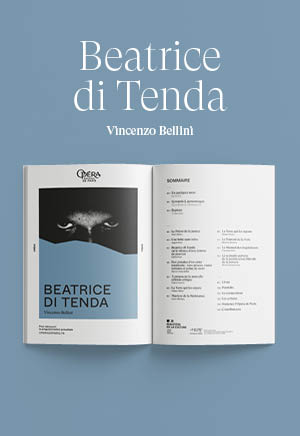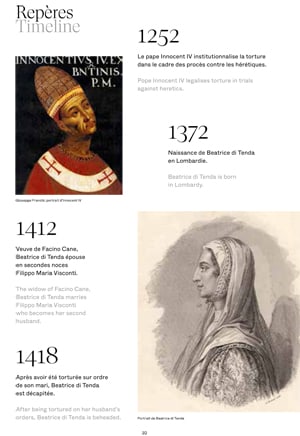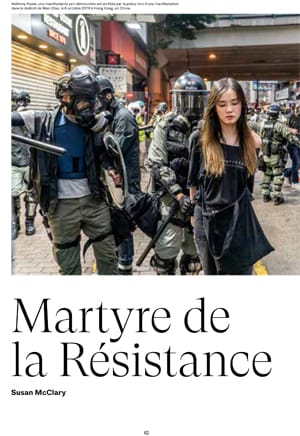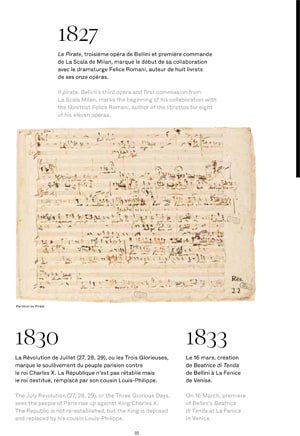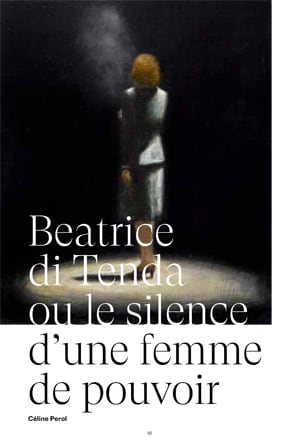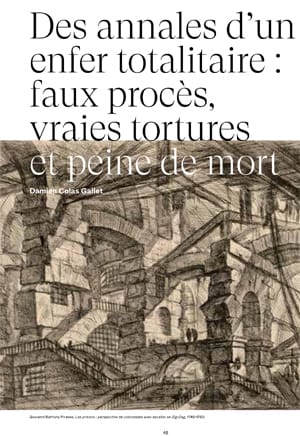Synopsis
Listen to the synopsis
False accusation, unjust imprisonment, torture and a death sentence: such was the unfortunate fate of Beatrice di Tenda, a real character who became the heroine of Vincenzo Bellini’s opera. The work was first performed at Venice’s La Fenice in 1833 without any real success, to the great displeasure of the composer who tackled powerful themes such as justice and the aspiration for freedom, in a score with crystaline and lyrical lines. For its entry into the Paris Opera repertoire, Peter Sellars is directing this little-known score, his first Italian opera. With set designer George Tsypin, he sets the work in a steel-walled palace, evoking the domination and surveillance exercised by a ruthless dictatorship.
Duration : 3h00 with 1 interval
Language : Italian
Surtitle : French / English
Artists
Opera seria in two acts (1833)
Based on the eponymous play by Carlo Tedaldi Fores
Creative team
Cast
Paris Opera Orchestra and Chorus
A coproduction with the Gran Teatre del Liceu, Barcelone
With the exceptional support of Aline Foriel-Destezet
A recording of Beatrice di Tenda will be made, directed by Peter Sellars and produced by the Opéra national de Paris, with the support of the Orange Foundation, patron of the Paris Opera's audiovisual broadcasts. It will be broadcast live on POP - the Paris Opera's streaming platform - on Thursday 15 February 2024 at 7.30 pm.
Media
Access and services
Opéra Bastille
Place de la Bastille
75012 Paris
Public transport
Underground Bastille (lignes 1, 5 et 8), Gare de Lyon (RER)
Bus 29, 69, 76, 86, 87, 91, N01, N02, N11, N16
Calculate my route-
Cloakrooms
Free cloakrooms are at your disposal. The comprehensive list of prohibited items is available here.
-
Bars
Reservation of drinks and light refreshments for the intervals is possible online up to 24 hours prior to your visit, or at the bars before each performance.
-
Parking
You can park your car at the Q-Park Opéra Bastille. It is located at 34 rue de Lyon, 75012 Paris.
In both our venues, discounted tickets are sold at the box offices from 30 minutes before the show:
- €35 tickets for under-28s, unemployed people (with documentary proof less than 3 months old) and senior citizens over 65 with non-taxable income (proof of tax exemption for the current year required)
- €70 tickets for senior citizens over 65
Get samples of the operas and ballets at the Paris Opera gift shops: programmes, books, recordings, and also stationery, jewellery, shirts, homeware and honey from Paris Opera.
Opéra Bastille
- Open 1h before performances and until performances end
- Get in from within the theatre’s public areas
- For more information: +33 1 40 01 17 82
Online
Opéra Bastille
Place de la Bastille
75012 Paris
Public transport
Underground Bastille (lignes 1, 5 et 8), Gare de Lyon (RER)
Bus 29, 69, 76, 86, 87, 91, N01, N02, N11, N16
Calculate my route-
Cloakrooms
Free cloakrooms are at your disposal. The comprehensive list of prohibited items is available here.
-
Bars
Reservation of drinks and light refreshments for the intervals is possible online up to 24 hours prior to your visit, or at the bars before each performance.
-
Parking
You can park your car at the Q-Park Opéra Bastille. It is located at 34 rue de Lyon, 75012 Paris.
In both our venues, discounted tickets are sold at the box offices from 30 minutes before the show:
- €35 tickets for under-28s, unemployed people (with documentary proof less than 3 months old) and senior citizens over 65 with non-taxable income (proof of tax exemption for the current year required)
- €70 tickets for senior citizens over 65
Get samples of the operas and ballets at the Paris Opera gift shops: programmes, books, recordings, and also stationery, jewellery, shirts, homeware and honey from Paris Opera.
Opéra Bastille
- Open 1h before performances and until performances end
- Get in from within the theatre’s public areas
- For more information: +33 1 40 01 17 82
Online

Discover opera and ballet in another way

Dive into the Opera world and get insights on opera and pop culture or ballet and cinema. Scan this code to access all the quiz and blindtests on your mobile.

3 min
Beatrice di Tenda
Bellini’s Beatrice di Tenda: the true/false story
People wrongly accused, jealous lovers and death sentences… Beatrice di Tenda has all the ingredients for a good opera. Will you untangle this complex synopsis? You’re up!
DiscoverPartners
-
-
With the support of The American Friends of the Paris Opera & Ballet
-
With the exceptional support of the Howard & Sarah D. Solomon Foundation. In tribute to Gerard Mortier.






































